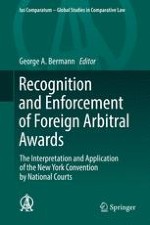2017 | OriginalPaper | Chapter
Interpretation and Application of the New York Convention in the Republic of Georgia
Author : Giorgi Tsertsvadze
Published in: Recognition and Enforcement of Foreign Arbitral Awards
Publisher: Springer International Publishing
Activate our intelligent search to find suitable subject content or patents.
Select sections of text to find matching patents with Artificial Intelligence. powered by
Select sections of text to find additional relevant content using AI-assisted search. powered by
